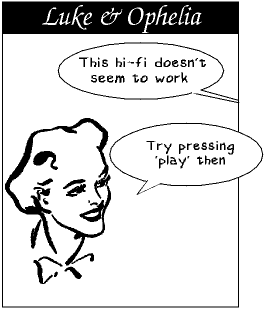And suddenly the major method of delivery of documents was by HTML. Millions of documents are flying between computers every second using HTML as the document structuring, and sometimes presentation, language.
That notwithstanding, many many of the documents sent to me by email are in the format of a major word processor that doesn't run on the computer I use. Oh, why don't I just say it, after all I'm not going to say anything nasty about it. OK: people send me documents in MS Word, and I work on a Unix machine, which causes me all sorts of grief and lost time while I attempt to read it (often to discover that it was only a text document anyway, with no markup whatsoever).
So why the difference? Why do people send me Word documents while most electronic document delivery is in the wonderfully platform-independent HTML?
Well, firstly I suppose, there are no good WYSIWYG editors for HTML yet (not that HTML can be WYSIWYG, since you don't know the width or height of the screen, nor even the size of the font the reader will be using, which I might say drives a lot of graphic designers crazy since they no longer have complete control over how their documents look, like some despotic leader suddenly having to accept democracy. Have I offended anyone yet?). Not that there isn't anything in HTML that makes WYSIWYG-style editors difficult. No, it is just that the quality of the HTML produced by the things is so poor. Hopefully it will get better as the software matures, but at the moment I know no one, except myself occasionally, who produces HTML by anything other than by hand.
On the other hand, people prefer to use WYSIWYG editors for, I would claim, obvious reasons.
This has led in some circles to the use of page description languages (PDL's) for distribution of documents; and although there are a number of them, PDF has apparently become the favourite.
Now PDF is a great way of distributing documents that are to be printed (better than MS Word too, because it is far less platform-dependent, and far better than the Postscript it replaces, since all the font agonies of yore are gone). But it is a terrible way of distributing documents that are meant to be read at the screen, and let me tell you why: the screen is not paper.
PDF is designed as a format for distributing documents that were originally designed for paper. Consequently it has none of the features you would expect of a format designed for the screen.
For a start there is no incremental display for PDF: you have to wait for the file to fully download before you can start reading it; the advantage of incremental display is that you can start reading a document more or less immediately it starts to arrive; since you may only be accessing the file to see if it is what you were looking for, this can save you a lot of time. This lack of incremental display is only compounded by the large files that are typical for PDF, thus extending download time.
Secondly the user interface for reading such documents is not good: it is not designed for reading sequentially on the screen, so you have to do a lot of work with your mouse, rather than just repeatedly pressing "Page Down".
Thirdly there is an accessibility problem: if you are sight-impaired you may have to increase the magnification of the page to read it. But by the time the magnification is large enough for you to read it, the column width of the text may be wider than the screen, so that to read each line you have to scroll the page left and right.
And another problem is that tools are required to produce the documents, tools which have to run on your machine, and which you may have to pay for. And this brings us to the final point: that the software is largely single sourced and therefore somewhat platform dependent.
Don't get me wrong: I'm not trying to knock PDF; it's just that it is important to match your documents to the mode that they will be read.

© Copyright Steven Pemberton, Amsterdam, 1998. All rights reserved.
First published in the SIGCHI Bulletin, October 1998